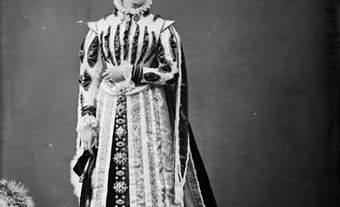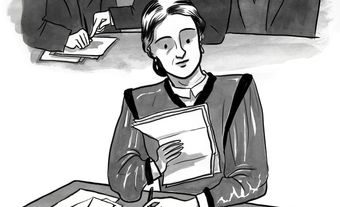
Mercy Coles was one of the daughters of George Coles, the first premier of Prince Edward Island. She attended the Charlottetown and Québec Conferences with her parents. Her diary, Reminiscences of Canada in 1864, is one of the most detailed sources about the events that preceded Confederation. The diary includes descriptions of the Fathers of Confederation and their personalities and brings light to the social politics of mid-19th-century Canada.
Family and Early Life
Mercy Coles was one of the 12 children of Mercy Haine and George Coles, the first premier of Prince Edward Island. While the Coles family was long established in PEI, the Haine family was English. George Coles and Mercy Haine met in England, where they married in 1833. They travelled to PEI the following year.
Mercy Coles grew up in Charlottetown, where her father was a prominent distiller and manufacturer prior to his political career. George Brown, a Father of Confederation from Canada West (Ontario) and editor of the Globe newspaper, described Mercy as one of George Coles’ “several attractive daughters, well educated, well informed, and sharp as needles.”
Charlottetown and Québec Conferences
Mercy Coles attended the Charlottetown and Québec Conferences in 1864 with her parents. The wives and unmarried daughters of the delegates were invited to the festivities that surrounded these events. Coles kept a detailed diary of her experiences, which has been preserved as Reminiscences of Canada in 1864. It describes many of the Fathers of Confederation and the social events that occurred amidst the official conference meetings.
Ballroom dances and socializing in the drawing room were not simply entertainments; for the delegates and their families, they were events at which valuable political networking took place. Prince Edward Island delegate Edward Whelan described the scene at the Québec Conference in his Charlottetown newspaper, the Examiner:
the Cabinet Ministers — the leading ones especially — are the most inveterate dancers I have ever seen; they do not seem to miss a dance the live-long night. They are cunning fellows; and there is no doubt that it is all done for a political purpose; they know if they can dance themselves into the affections of the wives and daughters of the country, the men will certainly become an easy conquest.
As the daughter of Prince Edward Island delegate George Coles, Mercy was approached by senior political figures hoping that she would influence her father to support Confederation. George was not swayed easily by the proposed plan for Confederation, stating that he would only agree to the terms of union should leasehold tenure, a longstanding issue in PEI, be abolished in the colony (see PEI Land Question). The Province of Canada delegation would not bend to the request — leaving it off the 72 Resolutions presented at the close of the Québec Conference — and George became a tough sell. (See also Prince Edward Island and Confederation.)
Mercy recorded her conversations at the Québec Conference with future Prime Minister John A. Macdonald. “Mr. J.A. Macdonald dined with us last night,” she writes. “After dinner he entertained me with any amount of small talk.” Days after, Mercy continues: “I went to dinner in the evening. John A. sat along side of me. What an old Humbug he is. He brought me my dessert into the Drawing Room. The Conundrum.”
Mercy was aware of the political importance of the festivities and noted in her diary when social events did not achieve their intended purpose. She wrote on 14 October 1864:
The Ball I believe was rather a failure as far as the delegates are concerned. The Quebec people never introduced the ladies nor gentlemen to any partners nor never seen whether they had any supper or not. The Col. Grays [John Hamilton Gray of PEI and John Hamilton Gray of NB] are both rather indignant at the way their daughters were treated.
At 26 years old, Mercy Coles was the second oldest of the unmarried women at the conferences and hoped that she would meet her future husband over the course of the year. Instead, she found that there were far more unmarried women in attendance. She wrote that 46-year-old Samuel Leonard Tilley, one of the delegates from New Brunswick and a widowed father of eight, was one of the few eligible bachelors at the Québec festivities. “It is rather a joke,” she writes. “He is the only beau of the party and with 5 single ladies he has something to do to keep them all in good humour.”
Mercy Coles contracted diphtheria during her time in Québec City and was treated by Dr. Charles Tupper, Premier of Nova Scotia. Her illness resulted in her absence from some of the festivities, but she received a continuous stream of visitors and reported the news they brought her. Following the Québec Conference, the Coles family followed the Confederation publicity tour to Montréal, Ottawa, Toronto and Niagara Falls.
Later Life
Mercy Coles continued to travel around Canada after the Confederation conferences, recording her experiences in her diary. The Coles family also experienced financial and personal hardship in the 1860s after George Coles’ manufacturing warehouses were destroyed in the great fire of Charlottetown on 15 July 1866. His mind began to deteriorate in subsequent years and he was cared for by his family, including by Mercy, until his death in 1875.
In 1917, the 50th anniversary of Confederation, Mercy Coles gave press interviews about her experiences at the historic conferences that lead to the union of British North America, recalling Sir John A. Macdonald’s concern for her health after her attack of diphtheria in Canada East (Québec). She explained the story to the Charlottetown Guardian:
On arriving at the hotel [in Montréal on 27 October 1864] I was surprised to find that I was the invalid for whom preparations had been made. Evidently Mr. Macdonald, who had always proved a very kind friend to me, had telegraphed ahead. I found the room, which had been assigned to me equipped with a large fireplace.
Mercy Coles died in Charlottetown in 1921.
Significance
Although her diary has never been published in its entirety, Mercy Coles and her impressions of the Fathers of Confederation have become part of Canadian cultural history. Coles is a central character in the annual re-enactments of the Confederation negotiations by the Confederation Players in Charlottetown, Prince Edward Island. Her diary is one of the key sources about the politics and personalities surrounding Confederation. Christopher Moore draws from Coles’ diary in order to flesh out the social dynamics of the Québec Conference in his book Three Weeks in Quebec City: The Meeting That Made Canada (2015).

 Share on Facebook
Share on Facebook Share on X
Share on X Share by Email
Share by Email Share on Google Classroom
Share on Google Classroom


